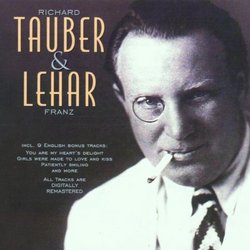| All Artists: Franz Lehar, Ernst Hauke, Henry Geehl, Ronnie Munro, Franz Schonbaumsfeld, Erich Wolfgang Korngold, Frank Collinson, Berliner Staatskapelle, Staatskapelle Berlin, Berlin Deutsche Künstler Theater Orchestra, Vienna Symphony Orchestra, Vienna Philharmonic Orchestra, Berlin Metropolitan Theater Orchestra, Lyceum Theatre Orchestra, Vera Schwarz, Carlotta Vanconti, Jarmila Novotna, Gitta Alpar, Evelyn Laye Title: Tauber & Lehar Members Wishing: 0 Total Copies: 0 Label: Angel Records Original Release Date: 1/1/2001 Re-Release Date: 10/2/2001 Album Type: Original recording remastered Genres: Special Interest, Pop, Classical Styles: Vocal Pop, Opera & Classical Vocal, Historical Periods, Modern, 20th, & 21st Century Number of Discs: 2 SwapaCD Credits: 2 UPC: 724356765221 |
Search - Franz Lehar, Ernst Hauke, Henry Geehl :: Tauber & Lehar
 | Franz Lehar, Ernst Hauke, Henry Geehl Tauber & Lehar Genres: Special Interest, Pop, Classical
|
Larger Image |
CD Details |
CD ReviewsA memento of a productive partnership. John Austin | Kangaroo Ground, Australia | 11/18/2001 (4 out of 5 stars) "EMI commemorate in this double CD a remarkable partnership in the C20th world of music. It began in Berlin in 1926. It had been 20 years since Franz Lehar's "Die lustige Witwe" became the light opera that everyone wanted to see. In places like Beunos Aires it had run simultaneously in five theatres in five different languages. Lehar's subsequent productions had met with diminishing success. His latest light opera, "Paganini", which contained some of his best music, had flopped at its Vienna premiere. Nervous and dispirited as its Berlin premiere drew near, Lehar wrote to the tenor Richard Tauber, "You must sing in Berlin, a second flop is inconceivable for me. I'm suddenly afraid of everything to do with the theatre - I'm getting old". Tauber obliged. The Berlin production was a resounding success, Tauber sometimes being required to repeat "Gern hab' ich die Frau'n gekusst" as many as five times. Lehar admitted, "Richard, during this moment I have been born again as an artist!" And so began a great final flowering of Lehar theatre productions, all featuring the Austrian tenor Richard Tauber. Fortunately the Lehar-Tauber association resulted in an extensive series of recordings, in many of which Lehar conducts the orchestra. EMI began issuing a collection of them towards the end of the LP era, and now, in 2001, they are collected onto this double CD. I read the claim that a great many of the tracks appear on CD for the first time, but here in Australia most have already been available on CD. I don't always find Tauber unexcelled in this repertoire, preferring other tenors sometimes and their recordings. Several of the "Paganini" recordings were made before the Berlin season opened. Tauber and his then wife Carlotta Vanconti sound as though they are sight-reading unfamiliar music. I once possessed several of the "Das Land des Lachelns" items on 78s. The 1929 sound seemed robust and full then, but seems sadly emasculated here. Tauber, I believe, somehow had the secret of touching the hearts and minds of all who listened to his singing - composers, colleagues, chancellors and charwomen. This comprehensive and well-planned issue will ensure that his work with the Hungarian composer Franz Lehar will continue to charm and delight."
|

 Track Listings (22) - Disc #1
Track Listings (22) - Disc #1